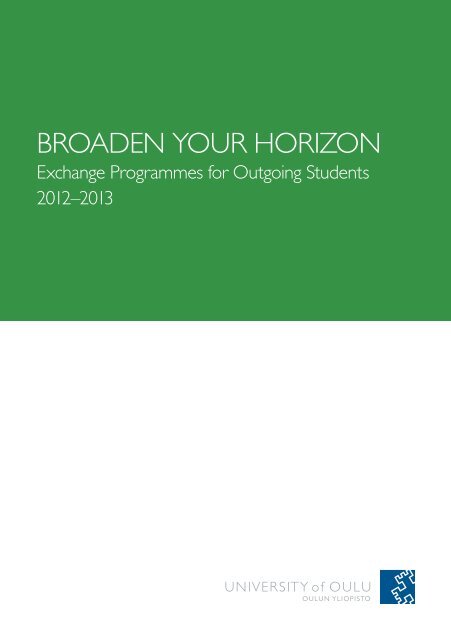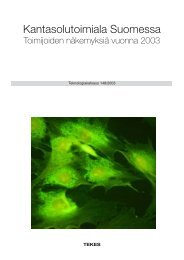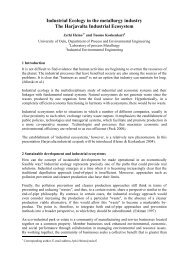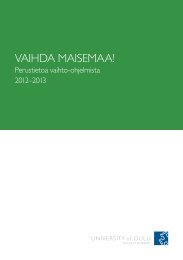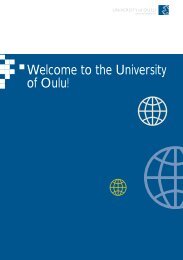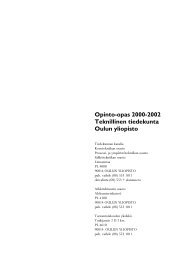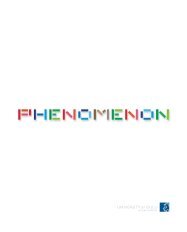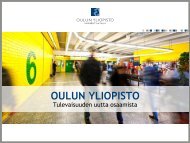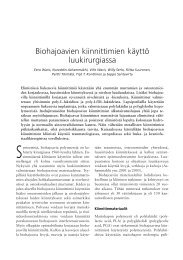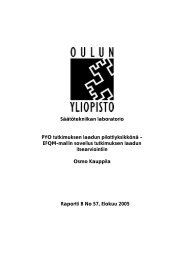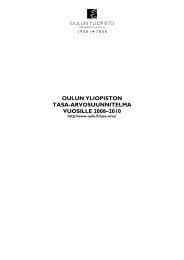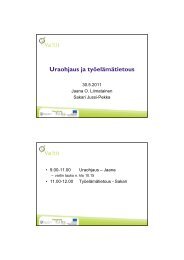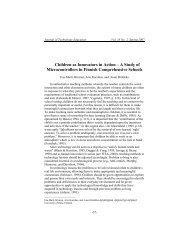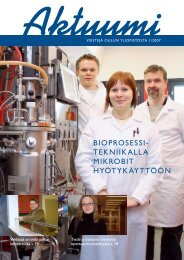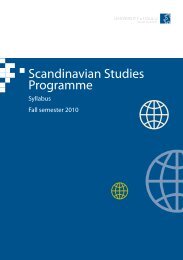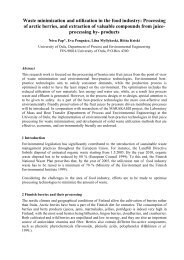Broaden your Horizon guide - Oulu
Broaden your Horizon guide - Oulu
Broaden your Horizon guide - Oulu
Create successful ePaper yourself
Turn your PDF publications into a flip-book with our unique Google optimized e-Paper software.
BROADEN YOUR HORIZON<br />
Exchange Programmes for Outgoing Students<br />
2012–2013
International Services<br />
January 2013<br />
Pictures: International Services, Janne Harpela<br />
(New Zealand), Sanna Heikkinen (Denmark,<br />
Iceland), Kristin Davies (Iceland),Teija Skants<br />
(Scotland)<br />
International Services reserves the right for<br />
changes.
1. General principles of student exchange 4<br />
2. Application process 5<br />
3. ERASMUS 8<br />
4. NORDPLUS 12<br />
5. Bilateral agreements 14<br />
6. ISEP 16<br />
7. UNC-EP 17<br />
8. FIRST 18<br />
9. north2north 20<br />
10. North-South-South 21<br />
11. Language proficiency 22<br />
12. Transferring the credits 23<br />
13. Important to remember! 24<br />
14. Checklist before going on exchange 26<br />
15. Contact information 28
1. GENERAL PRINCIPLES OF STUDENT<br />
EXCHANGE<br />
In general, all degree students of the University<br />
of <strong>Oulu</strong> can apply for a student exchange. This<br />
means that they can study a part of their degree<br />
in a partner university abroad. There are several<br />
programmes and hundreds of universities to<br />
choose from. The length of a student exchange is<br />
usually 1 or 2 terms. For more information on this<br />
please see exchange programme specific details<br />
in this <strong>guide</strong>.I n order to go on exchange students<br />
need to have their first year of academic studies<br />
completed at the University of <strong>Oulu</strong>.<br />
Information on student exchange possibilities<br />
can be found in this <strong>guide</strong>, and on the International<br />
Services website. Available exchange places<br />
are announced through a call for application<br />
(hakukuulutus) when an application period begins.<br />
Application rounds are organised either by the<br />
International Relations (e.g. bilateral places) or the<br />
departments/faculties (e.g. ERASMUS) depending<br />
on the exchange programme. In a nutshell,<br />
European exchange programmes (ERASMUS and<br />
NORDPLUS) are coordinated by the departments<br />
and faculties. The International Services<br />
coordinates exchange programmes outside<br />
Europe. Please note that application periods<br />
and deadlines vary depending on the exchange<br />
programme.<br />
Each faculty/department in the University of<br />
<strong>Oulu</strong> also has its own international coordinator,<br />
who is there to help with student exchange<br />
matters. Departmental coordinators and the staff<br />
members of International Servces are available for<br />
personal counselling and for detailed information<br />
about the application and selection procedure.<br />
Please note that all academic matters should be<br />
discussed at the department/faculty.<br />
When you start planning <strong>your</strong> exchange<br />
international master’s degree students should bare<br />
in mind that the duration of a master’s programme<br />
is 2 years and graduating in time is important.<br />
Master students’ study plan contains a set of<br />
precisely defined courses, which are required for<br />
graduation. This sets more specific requirements<br />
for the planning of <strong>your</strong> exchange period. Thus,<br />
before applying for an exchange, it is essential to<br />
discuss <strong>your</strong> study progress and <strong>your</strong> possibilities<br />
for exchange studies with <strong>your</strong> master’s degree<br />
programme coordinator.<br />
During the selection process the applicants<br />
will be ranked on the basis of the GPA of their<br />
university studies, the amount of study points<br />
earned, and the language skills required by the<br />
host university. Academic references may also<br />
be required. Applicants are usually invited to a<br />
group interview. Kindly note, that some exchange<br />
programmes apply terms and conditions based on<br />
nationality and citizenship, so foreign students are<br />
encouraged to check carefully and well in advance<br />
whether they are eligible to apply..<br />
4
2. APPLICATION PROCESS<br />
The exchange programmes offered at the<br />
University of <strong>Oulu</strong> are open for both bachelor and<br />
master level degree students unless otherwise<br />
stated. In order to be eligible for exchange a<br />
student must be enrolled at the University of<br />
<strong>Oulu</strong> as a degree student. First year students are<br />
not eligible to go on exchange but they can apply<br />
for an exchange place for their second year of<br />
studies. The lenght of an exchange period is 3 to<br />
12 months.<br />
2.1. Call for Applications<br />
International Services announces the available<br />
exchange destinations through a Call for Exchange<br />
Applications. The call includes all necessary<br />
information on the application period, times of the<br />
possible information sessions, required enclosures<br />
and possible interviews. A printed version of<br />
the call is always available from the International<br />
Relations office. Students will also receive the call<br />
through e-mail if they have subscribed to some of<br />
the guild lists.<br />
N.B.! Some of the exchange programmes<br />
are coordinanted by the departments (e.g.<br />
ERASMUS). In these cases the departments<br />
are responsible for the call for applications.<br />
Please note that departments’ ways of informing<br />
studens about their calls can differ from that of<br />
International Services’.<br />
2.2. SoleMOVE Application Database<br />
For all exchange applications regardless of<br />
the programme or the cooridinating unit the<br />
University of <strong>Oulu</strong> uses an electronic database<br />
called SoleMOVE. Through the database<br />
students can also scroll the list of existing<br />
exchange destinations. SoleMOVE is an internet<br />
based system and students can log on from any<br />
computer that has an internet connection by using<br />
the same username and password as they use for<br />
the university network.<br />
The whole application is filled out electronically<br />
meaning that even all enclosures (e.g. Transcript of<br />
records) are uploaded to the SoleMOVE system. If<br />
a student is required to hand in certain documents<br />
after the exchange, that too will happen through<br />
SoleMOVE.<br />
Please note that SoleMOVE is used for<br />
incoming and outgoing exchange applications by<br />
the University of <strong>Oulu</strong> only. Should a student<br />
be accepted for an exchange period s/he could<br />
be required to fill out another application to the<br />
host university according to the host university’s<br />
process.<br />
Every term during the application periods<br />
the International Services organise information<br />
sessions in which students are adviced on how to<br />
use SoleMOVE. Separate info sessions are available<br />
for those applying to European destinations and<br />
for those applying for an exchange place outside<br />
Europe.<br />
5
2.3. Application Enclosures<br />
MOTIVATION LETTER<br />
A Motivation Letter, also known as Personall<br />
Statement or a Statement of Purpose, is a<br />
mandatory enclosure for all exchange destinations<br />
coordinated by the International Services. The<br />
aim of a motivation letter is to give a clear and<br />
concise description on why the student is applying<br />
for an exchange place. The letter should also tell<br />
something about the personality of the applicant<br />
as well as underlining why the applicant is suitable<br />
for the specific destination(s) s/he has chosen to<br />
apply to.<br />
At . least the following matters should be included<br />
in a motivation letter:<br />
1. The name of the university the student is<br />
applying to and the period of exchange.<br />
2. What are the aims of the exchange and the<br />
possible long term advantages gained from the<br />
exchange.<br />
3. A description of planned studies and why those<br />
studies are beneficial to the applicant.<br />
Other matters can also be included should they<br />
seem important for the writer. It should be borne<br />
in mind that the main emphasis of the letter should<br />
be on academic reasons. A motivation Letter is<br />
written in English and should not be more than<br />
one A4 sheet in length (one sided)<br />
LETTER OF REFERENCE<br />
A Letter of Reference (or Academic Reference),<br />
written by a member of the academic staff,<br />
highlights the applicant’s academic skills and<br />
achievements. It is desirable that the person<br />
writing the reference has some kind of personal<br />
insight to the student’s personality, for example<br />
through teaching. This way the reference will be<br />
more in-depth without being simply a summary<br />
of the applicant’s transcript of records. The<br />
person giving the reference does not need to<br />
be a professor, although especially American<br />
universities might value a professor’s opinion more<br />
highly. The most important aspect is that the<br />
person actually knows the student.<br />
6
LANGUAGE PROFICIENCY<br />
Most of the universities abroad require the<br />
exchange students to provide them with some<br />
kind of a certificate proving their language<br />
proficiency if the student is not a native English<br />
speaker. Language proficiency can be proven with<br />
an official language test (e.g. TOEFL, IELTS) or<br />
with a written certificate from the University of<br />
<strong>Oulu</strong> Language Services according to the HOST<br />
UNIVERSITY’S requirements. Please note that in<br />
some cases an applicant can be asked to prove<br />
their language skills in other languages than English,<br />
for example, for some exchange destinations<br />
Spanish.<br />
In the Call for Application it is clearly stated<br />
in the description of each destination if that<br />
particular university requires applicants to provide<br />
a TOEFL/IELTS results. If the university does not<br />
require an official language test it automatically<br />
means that the students accepted to that<br />
university have to acquire the language certificate<br />
written by the Language Services. In a nutshell, all<br />
students applying to destinations outside Europe<br />
should be prepared to acquire either of the before<br />
mentioned certificates.<br />
7
3. ERASMUS<br />
3.1 General information about Erasmus<br />
exchange programme<br />
Erasmus is a European Union exchange<br />
programme that aims to support European higher<br />
education cooperation and mobility. Erasmus is<br />
part of the European Union’s Lifelong Learning<br />
programme (Life Long Learning Programme, 2007-<br />
2013). It is intended to citizens of the EU and to<br />
those who have gained permanent residence in<br />
one of the EU countries.<br />
Erasmus programme is open to all EU member<br />
countries and Norway, Iceland, Liechtenstein,<br />
Turkey, Croatia and Switzerland.<br />
Programme is open for undergraduate and<br />
graduate students in all academic fields. New<br />
students are not eligible for a exchange during<br />
their first year but can apply for a exchange for<br />
their second year. Application period is usually<br />
in spring term. In some cases departments can<br />
organise an application round in the fall term too,<br />
if they still have available places. Follow the notice<br />
boards or contact the international coordinator<br />
at <strong>your</strong> department for more information<br />
on Erasmus application rounds. The contact<br />
information for all departmental coordinators can<br />
be found from chapter 3.6.<br />
The exchange period in Erasmus programme<br />
is 3-12 months. In practice that means 1 or 2<br />
terms. It is a good idea to consider spending a full<br />
term or even a full academic year abroad. Should<br />
you decide to stay longer, it is usually possible to<br />
extend <strong>your</strong> stay if both the home and the host<br />
universities agree on this. However, should you<br />
extend <strong>your</strong> stay you will not be automatically<br />
entitled to any additional Erasmus grant.<br />
As in all exchange programmes, you should<br />
make sure that the studies you are planning to do<br />
during <strong>your</strong> exchange will be transferred into <strong>your</strong><br />
degree in <strong>Oulu</strong>. In Erasmus you are required to<br />
make a study plan (Learning Agreement) prior to<br />
<strong>your</strong> exchange and have it signed by <strong>your</strong> home<br />
and <strong>your</strong> host university. If <strong>your</strong> study plan changes<br />
at any point, you are required to write a Changes<br />
to Learning Agreement and have it signed.<br />
8
HOW TO APPLY FOR ERASMUS?<br />
1. Find out which European universities have<br />
a partner agreement with <strong>your</strong> department.<br />
All Eramus destinations are listed also in the<br />
SoleMOVE system. Check from <strong>your</strong> coordinator<br />
which of those destinations are available to you.<br />
Departmental coordinators usually have a listing of<br />
the partner universities’ websites where you can<br />
find information on their course selection.<br />
2. Contact <strong>your</strong> departmental coordinator,<br />
s/he will advise you with<br />
a) application deadlines<br />
b) SoleMOVE database<br />
c) Learning Agreement (i.e. study plan that<br />
must be signed by both home and host<br />
institution, the signature of <strong>your</strong> home department<br />
is a reassurance that <strong>your</strong> studies will be accepted<br />
as a part of you degree at the University of <strong>Oulu</strong>)<br />
If <strong>your</strong> Learning Agreement changes during <strong>your</strong><br />
exchange a new LA needs to be signed by both<br />
institutions.<br />
3. Find out about the language requirements<br />
in the host university. Also, find out whether<br />
language courses are organised and whether they<br />
are liable to a fee. You can get more information<br />
from the departmental coordinators, study <strong>guide</strong>s<br />
and partner university websites. It is never too<br />
early to start practising <strong>your</strong> language skills!<br />
4. Ask <strong>your</strong> departmental coordinator about<br />
housing arrangements in the host university.<br />
Check also the hosting university website for<br />
more information.<br />
3.2. Erasmus grant<br />
All outgoing exchange students receive an<br />
ERASMUS grant which can be given to a student<br />
only once. However, the following five conditions<br />
have to be fulfilled:<br />
1. The exchange period is 3-12 months<br />
2. Student makes a Learning Agreement (i.e.<br />
study plan) which is approved and signed by the<br />
students’ home university and host university<br />
3. Studies in the host university must be<br />
accepted as a part of <strong>your</strong> degree at the Univeristy<br />
of <strong>Oulu</strong><br />
4. One year of university is completed<br />
before a student can go on exchange (master’s<br />
degree students: please consult you programme<br />
coordinator since different rules may apply<br />
depending on the programme)<br />
5. Host university does not charge tuition fees<br />
(N.B. You might be expected to pay student union<br />
fees, library fees, etc,)<br />
Erasmus grant will be paid to the student in<br />
two parts so that EUR 200 of the total grant will<br />
be detained and paid to the student AFTER the<br />
exchange and once all the required documents<br />
have been uploaded to the SoleMOVE system.<br />
ERASMUS GRANTS 2012-2013:<br />
Exchange period:<br />
Faculty of Humanities<br />
Amount:<br />
3 months 800 eur<br />
4-6 months 1200 eur<br />
7-10 months 1800 eur<br />
11-12 months 2200 eur<br />
9
3.3 KELA Financial Aid for Students<br />
Students who are entitled to the financial aid<br />
by KELA will receive it also during their exchange.<br />
Financial aid is EUR 298 per month and Housing<br />
supplement abroad is EUR 210 per month.<br />
Housing supplement to low-rent countries such<br />
as Bulgaria, Romania, Slovenia, Latvia, Lithuania,<br />
Poland, Czech Republic, Estonia, Slovakia and<br />
Hungary varies from 58,87 to 109,32 per month.<br />
More information can be found from Kela website<br />
(www.kela.fi)<br />
The government guaranteed study loan (EUR<br />
600 per month) is also available during exchange.<br />
3.4. Insurance<br />
Students are responsible for arranging the<br />
necessary travel and health insurances for their<br />
exchange period. The European Health Insurance<br />
card granted by KELA must be obtained by the<br />
student. With this card student receives medical<br />
care during temporary stay in the EU or EAA<br />
countries or Switzerland. However, students are<br />
strongly recommended to have a separate travel<br />
and health insurance. Also note, that having a<br />
certain kind of an insurance is often a prequisite<br />
for obtaining a visa/residence permit to most<br />
countries. More information about the visa<br />
requirements can be acquired from the country’s<br />
embassy or from the host university.<br />
3.5 Erasmus Placements<br />
In addition Erasmus excahange, students also<br />
have the possibility to gain work experience<br />
through ERASMUS Placement. Placement enables<br />
students at higher education institutions to spend<br />
a placement (traineeship/internship) period<br />
between 3 months and 12 months in an enterprise<br />
or organisation in another participating European<br />
country. Outgoing trainees may be eligible a<br />
monthly Erasmus scholarship from the University<br />
of <strong>Oulu</strong> depending on whether they get paid<br />
for the traineeship and on the number of<br />
available scholarships.<br />
Outgoing ERASMUS Placement students<br />
can also apply for an intensive language course<br />
(EILC) organised in the host country before their<br />
placement begins.<br />
For more information and guidance concerning<br />
ERASMUS Placements, please contact Titta Koski<br />
(titta.koski@oulu.fi) at the Counseling and Career<br />
Services.<br />
3.6 ECTS-points<br />
Erasmus programme uses European Credit<br />
Transfer System (ECTS). ECTS system ensures<br />
transfer of obtained study credits from one<br />
country to another. In the University of <strong>Oulu</strong>, one<br />
ECTS is equal to one study point (opintopiste).<br />
Grading equivalents are following: A=5, B=4, C=3,<br />
D=2, E=1.<br />
3.7 EILC (Erasmus Intensive Language<br />
Courses)<br />
The Erasmus Intensive Language Courses (EILC)<br />
are specialised courses organised in less widely<br />
used and less taught European languages. Students<br />
who have been acceptd for Erasmus exchange<br />
(or placement) can apply for EILC if courses are<br />
organised in their host country. EILC courses<br />
usually last for 4-6 weeks and are organised<br />
before the actual semester starts between July-<br />
September and January-February. The duration of<br />
EILC course will not be regarded as a part of the<br />
exchange period.<br />
EILC courses are free of charge and accepted<br />
students will receive a separate grant of EUR 400<br />
for the course in addition to the Erasmus grant.<br />
Courses organised during the academic year<br />
2012-2013 can be found online at the European<br />
Comission website at: http://ec.europa.eu/<br />
education/erasmus/eilc1011_en.htm<br />
10
To apply for an EILC course, please fill out<br />
the electronic application form at www.oulu.fi/<br />
yliopisto/opiskelu/vaihto-opiskelu/eilc-kielikurssit.<br />
The form has to be submitted via e-mail to<br />
Riitta Kataja (riitta.kataja@oulu.fi) by the deadline.<br />
Application deadline for the courses in Autumn<br />
2013 is in May.<br />
3.8 Departmental Coordinators<br />
Each department is responsible for making and<br />
renweing their own Erasmus agreements. For<br />
this reason, the selection of available places can<br />
differ considerably between departments. All valid<br />
Erasmus agreements are listed in the SoleMOVE<br />
database. Contact <strong>your</strong> own departmental<br />
coordinator to make sure which agreements apply<br />
to <strong>your</strong> department.<br />
Departments are responsible for application<br />
rounds during spring term. It is worth bearing<br />
in mind that not all destinations are necessarily<br />
open for applications each year even though the<br />
agreement is valid.<br />
For more information please contac <strong>your</strong><br />
departmental coordinator. All e-mail addresses<br />
are firstname.surename@oulu.fi unless otherwise<br />
stated.<br />
Oili Sievola, tel. 0294 483428<br />
Faculty of Education<br />
Jani Haapakoski, tel. 0294 483715<br />
<strong>Oulu</strong> Business School<br />
Merja Inget, tel. 0294 487780<br />
Faculty of Medicine<br />
Clinical Medicine: Virpi Parkkila<br />
tel. 08 315 4125<br />
Dentistry: Jorma Virtanen, tel. 029 485584<br />
Nursing Science Ulla Timlin tel. 0294 485111<br />
Biocenter: Sinikka Eskelinen, tel. 0294 484106<br />
Medical Technology: Anna Jauho<br />
tel. 0294 486005<br />
Faculty of Science<br />
Astronomy: Jouko Raitala, tel. 0294 481945<br />
Biochemistry: Jari Heikkinen, tel. 0294 481208<br />
Biology: Minna Vanhatalo, tel. 0294 481491<br />
Chemistry: Marja Lajunen, tel. 0294 481632<br />
Geosciences: Seija Roman, tel. 0294 481442<br />
Geography: Topiantti Äikäs, tel. 0294 481728<br />
Information Processing Science: Juha Iisakka<br />
tel. 0294 481895<br />
Mathematics: Tero Vedenjuoksu,<br />
tel. 0294 481754<br />
Physics, Biophysics: Kari Kaila,<br />
tel. 0294 481283<br />
Faculty of Technology<br />
Architecture: Leena Kuorelahti, tel. 0294<br />
484985<br />
Electrical and Information Engineering:<br />
Maritta Juvani, tel. 0294 482767<br />
Mechanical Engineering: Yrjö Louhisalmi, tel.<br />
0294 482054<br />
Process and Environmental Engineering:<br />
Marita Puikkonen, p. 0294 482309<br />
Industrial Engineering: Paulus Lakkala, p. 040<br />
8353753<br />
11
4. NORDPLUS<br />
4.1. Nordplus<br />
Nordplus and Nordlys are Nordic exchange<br />
programmes for undergraduate and graduate<br />
students and for university teachers. Nordplus<br />
and Nordlys cover the five Nordic Countries<br />
(Finland, Sweden, Norway, Denmark, and Iceland)<br />
as well as Åland, Faroe Islands, Greenland, and<br />
Svalbard (which are autonomous regions of<br />
the Nordic countries) and Baltic countries. The<br />
programme began in 1988 and its objective is to<br />
promote and strengthen Nordic collaboration in<br />
the field of higher education.<br />
Nordplus exchange is organised through<br />
Nordplus networks which operate on<br />
departmental level. Many of the departments at<br />
the University of <strong>Oulu</strong> have set up a network with<br />
other Nordic Universities. Each network has its<br />
own Nordplus coordinator.<br />
4.2. Applying for Nordplus Exchange<br />
• Undergraduate and graduate students from<br />
all academic fields can apply for this exchange<br />
programme<br />
• New students cannot go on exchange during<br />
their first year but can apply to go on their second<br />
year<br />
• The exchange period in Nordplus and<br />
Nordlys programmes is 1-12 months (usually one<br />
or two semesters). It is possible to go for Nordplus<br />
exchange several times, however, the total<br />
duration can not exceed 12 months<br />
• Studies in the host university must be<br />
accepted as a part of <strong>your</strong> degree at the Univeristy<br />
of <strong>Oulu</strong><br />
• During the exchange period the student<br />
must live in the host country (it is not allowed to<br />
commute from Finland).<br />
4.3. Nordlys<br />
If <strong>your</strong> department does not belong to any<br />
network, you can apply to Nordplus exchange<br />
through the Nordlys network coordinated by<br />
International Services. Nordlys can also be used<br />
if you wish to study something else than <strong>your</strong><br />
own field during <strong>your</strong> exchange although priority<br />
is given to students whose department does<br />
not have a network. Almost all of the Nordic<br />
universities take part in Nordlys. Nordplus<br />
applications are submitted to <strong>your</strong> department/<br />
faculty, Nordlys applications to the International<br />
Services. Application periods may vary. Please<br />
consult <strong>your</strong> department/faculty and/or Nordlys<br />
coordinator at the International Services, Sanna<br />
Heikkinen (tel. 0294 484047, sanna.heikkinen@<br />
oulu.fi)<br />
Nordplus students receive a scholarship of 200<br />
euros per month. Some networks may also give a<br />
separate travel grant if the network has received<br />
funding for this.<br />
NB!<br />
Many Nordic universities are participating in<br />
both Erasmus and Nordplus programmes so<br />
there may be several paths to apply to a certain<br />
university.<br />
12
4.4 Nordplus Networks at the University<br />
of <strong>Oulu</strong><br />
Architecture<br />
Leena Kuorelahti, tel. 0294 484985<br />
Biology<br />
Annamari Markkola, tel. 0294 481530<br />
Faculty of Education<br />
Jani Haapakoski, tel. 0294 483715<br />
Faculty of Humanities<br />
Oili Sievola, tel. 0294 483428<br />
Economics<br />
Merja Inget, tel. 0294 487780<br />
Medicine<br />
Virpi Parkkila, tel. 08 3154125<br />
Technology<br />
Outi Simi, tel. 0294 482004<br />
13
5. BILATERAL AGREEMENTS<br />
University of <strong>Oulu</strong> has several bilateral student<br />
exchange agreements with partner universities<br />
around the world. In general, bilateral places are<br />
available for both undergraduate and graduate<br />
students in all academic fields. All partner<br />
universities can be found in the SoleMOVE<br />
database.<br />
International Services coordinate an application<br />
round for bilateral exchanges twice a year in the<br />
beginning of each term. The schedule for both<br />
application rounds can be found next page.<br />
Should some of the destinations be restricted to<br />
certain fields of study, this will be noted in the Call<br />
for Applications. The length of a bilateral exchange<br />
period is one term. All selected students are<br />
entitled to a grant which is EUR 1100 for students<br />
going to USA and Canada and EUR 1300 for other<br />
coutries. Grants for bilateral places in Germany<br />
are the same as in Erasmus.<br />
Some overseas destinations may not be open<br />
for applications every year. Once an application<br />
period has begun it will be announced through<br />
a Call fo Applications (hakukuulutus) that will be<br />
available on notice boards and online at www.oulu.<br />
fi/yliopisto/opiskelu/vaihto-opiskelu. International<br />
Services also send the notice through student<br />
e-mail lists.<br />
Please note that some partner universities<br />
require students to take TOEFL/IELTS language<br />
test prior to acceptance.<br />
For further information please contact the<br />
coordinators.<br />
COORDINATORS:<br />
Riitta Kataja: Buffalo, Newcastle, RMIT, Japan,<br />
Waterloo, Lakehead<br />
Sanna Heikkinen: north2north-, FIRST, Nordlys<br />
Anja Mäläskä: other bilateral agreements, ISEP<br />
and UNC-EP programmes<br />
14
APPLICATION SCHEDULE 2012-2013<br />
Please not that the list presented below is subject to change.<br />
24 September-15 October 2012:<br />
Mainly English-speaking destinations<br />
Australia<br />
- Griffith University<br />
- Royal Melbourne Institute of Technology (RMIT)<br />
- University of Canberra<br />
- University of Melbourne<br />
- University of Newcastle<br />
Canada<br />
- Lakehead University<br />
- University of Waterloo<br />
- Université de Montréal<br />
United States<br />
- East Carolina University<br />
- Michigan Technological University<br />
- Montana State University<br />
- Pittsburg State University<br />
- Washington College<br />
- University of Missouri - St. Louis<br />
- University of NC at Greensboro<br />
- University of NC at Wilmington<br />
- University of North Dakota<br />
- State University of NY at Buffalo<br />
ALSO:<br />
South Korea (iKEMM)<br />
- Pukyong National University<br />
- Pusan National University<br />
16 January-6 February 2013:<br />
Asia, Latin America, Russia, Nordlys and<br />
n2n<br />
Argentina<br />
- Universidad del Salvador<br />
Brazil<br />
- Universidade de São Paulo<br />
- PUC Parana, Pontificia Universidade Catolica do<br />
Parana<br />
Chile<br />
_ University Viña del Mar<br />
Mexico<br />
- Tec de Monterrey<br />
China<br />
- Jiangxi University of Finance and Economics<br />
- Shanghai Jia Tong University<br />
Hong Kong<br />
- Chinese University of Hong Kong<br />
Japan<br />
- Hokkaido University<br />
- Tohoku University<br />
- Nara Institute of Science and Technology, Osaka<br />
University, Kyoto University<br />
- Osaka Sangyo University<br />
Singapore<br />
-The National University of Singapore<br />
United States<br />
- Michigan Technological University<br />
- Pittsburg State University<br />
- University of North Dakota<br />
- Washington College<br />
- University of Missouri - St. Louis<br />
- University of NC at Greensboro<br />
Germany<br />
- Eberhard-Karls-Universität Tübingen<br />
FIRST, n2n ja Nordlys Programmes<br />
15
6. ISEP<br />
6.1. International Student Exchange<br />
Programme<br />
ISEP stands for International Student<br />
Exchange Programme. ISEP is available for<br />
both undergraduate and graduate students in<br />
all academic fields except for clinical medicine.<br />
The exchange period is either one or two terms.<br />
For more information please visit www.isep.org.<br />
International students need to consult with the<br />
International Services staff about their eligibility for<br />
this programme.<br />
There are three ISEP programmes to choose<br />
from: US ISEP, International-to-International<br />
and Direct. The US ISEP and Internationalto-International<br />
programmes are based on<br />
reciprocity. This means that an outgoing exchange<br />
student pays for housing, meals and student union<br />
fee to his/her home university prior to departure<br />
and hence will receive the same benefits free of<br />
charge in the host university. An outgoing ISEPstudent<br />
from Finland would pay the student union<br />
fee and 2825 EUR / one term or 5650 EUR / two<br />
terms (in year 2009-2010). In addition to these<br />
payments, students are responsible for their own<br />
personal expenses, insurances etc.<br />
TOEFL language test (or equivalent) is<br />
required for most English speaking destinations,<br />
and a sufficient level of Spanish/Japanese is<br />
usually required in Latin American and Japanese<br />
universities accordingly. The application period<br />
for all ISEP programmes is in September-October.<br />
Study programme in the host university is planned<br />
according to the students’ own interests, previous<br />
studies and curriculum possibilities offered by each<br />
of the host universities.<br />
In US ISEP programme the destination<br />
universities are located in USA and Canada.<br />
Detailed list of ISEP host universities can be<br />
found at http://www.isep.org/Students/Directory/<br />
members_in_usa.asp<br />
If selected to the programme students are<br />
entitled to a grant of EUR 1100.<br />
6.2 International-to-International ISEP<br />
In International-to-International ISEP exchange<br />
the host universities are located outside North<br />
America. Available Internationa-to-Internationa<br />
ISEP pratners may vary from year to year.<br />
If selected for Internationa-to-International ISEP<br />
students will get a grant of EUR 1300<br />
6.3 ISEP Direct<br />
ISEP-Direct is different from the other ISEP<br />
programmes in a sense that it is not based on<br />
reciprocity. Instead, students pay for the tuition,<br />
accommodation and food themselves at the host<br />
university according to their fees. If you choose<br />
to go on exchange through ISEP-Direct you<br />
are entitled to a similar grant as in other ISEP<br />
programmes.<br />
For more information about ISEP please contact<br />
Anja Mäläskä, anja.malaska@oulu.fi.<br />
16
7. UNC-EP<br />
UNC-EP is a student exchange programme<br />
between a consortium of American and Finnish<br />
universities: sixteen universities in North Carolina<br />
(US) and five universities in Finland (Kuopio,<br />
Jyväskylä, <strong>Oulu</strong>, Tampere and Vaasa).<br />
UNC-EP is available for both undergraduate and<br />
graduate students (US citizens excluded) in all<br />
academic fields. Exchange period is either 1 or 2<br />
terms.<br />
Students pay for food and accommodation at<br />
the host universities but no tuition fees. The<br />
application period is in September-October. If<br />
selected students will get a grant of EUR 1100 (in<br />
year 2012-2013).<br />
TOEFL/IELTS language test is required for all<br />
outgoing UNC-EP exchange students. For more<br />
information on the US partners please see: www.<br />
uncep.org<br />
For more information about UN-CEP please<br />
contct Anja Mäläskä, anja.malaska@oulu.fi.<br />
17
8. FIRST<br />
FIRST stands for Finnish-Russian Student<br />
Exchange. The programme is open for applications<br />
from undergraduate and graduate students in<br />
all academic fields. In order to participate in this<br />
exchange programme, the student needs to<br />
have Russian or Finnish citizenship or permanent<br />
residense permit (A-type or P)<br />
Exchange period is 3-12 months, and all studies<br />
in the host university must be accepted as a part<br />
of <strong>your</strong> degree at the Univeristy of <strong>Oulu</strong>. The<br />
universities are located in the Russian Federation,<br />
and the application period is in January-February.<br />
1.Arkangelsk State Technical University (www.<br />
agtu.ru/) Fields: Engineering, Humanities<br />
2. Karelian State Pedagogical Academy (kspu.<br />
karelia.ru/) Fields: Education, Humanities<br />
3. Murmansk State Technical University (www.<br />
mstu.edu.ru/) Fields: Business Studies, Engineering,<br />
Geography, Geology, Humanities, Mathematics,<br />
Informatics, Natural Sciences<br />
8. Herzen State Pedagogical University of<br />
Russia, St. Petersburg (www.herzen.spb.ru/en/)<br />
Fields: Geography, Geology, Humanities<br />
9. St. Petersburg National Research University<br />
of information Teachnologies, Mechanics<br />
and Optics, Institute of Refrigeration and<br />
Biotechnologies (www.sarft.spb.ru/) Fields:<br />
Business Studies<br />
If selected, students are entitled to a grant, the<br />
amount depending on the destination city:<br />
- EUR 500 for Petrozavodsk State University<br />
and Karelian State Pedagogical University<br />
- EUR 700 for Arkhangelsk Technical State<br />
University, Murmansk State Technical University,<br />
Northern State Medical University and Pomor<br />
State University<br />
- EUR 1200 for Herzen State Pedagogical<br />
University and St. Petersburg National Research<br />
University of information Teachnologies,<br />
Mechanics and Optics, Institute of Refrigeration<br />
and Biotechnologies.<br />
4. Murmansk Humanities Institute (www.<br />
mginet.ru/) Fields: Business Studies, Langauges<br />
and Philology, Communication and Information<br />
Sciences<br />
5. Northern State Medical University (www.<br />
nsmu.ru/) Fields: Humanities, Medical Sciences<br />
The application for round for FIRST<br />
programme will be in January-February 2013.<br />
For further information contact Sanna Heikkinen<br />
at the International Services or the Center for<br />
International Mobility. CIMO’s web site: www.<br />
cimo.fi<br />
6. Petrozavodsk State University (petrsu.ru)<br />
Fields: Architecture, Urban and Regional<br />
Planning, Geography, Geology, Humanities,<br />
Mathematics, Informatics, Natural Sciences<br />
7. Pomor State University (www.pomorsu.ru/)<br />
Fields: Business Studies, Humanities<br />
18
9. north2north<br />
University of <strong>Oulu</strong> is a member in the<br />
University of the Arctic and hence eligible to send<br />
students on exchange through its north2north<br />
programme. The possible host universities are<br />
located in Canada, Russian Federation, and the<br />
United States. Sweden, Norway and Iceland<br />
are also icluded in the programme but it is<br />
recommended that exchanges to these countries<br />
are made through Erasmus or Nordplus.<br />
The programme is open for students, whose<br />
studies have a northern emphasis, and/or who<br />
are dedicated to contributing to the northern<br />
community. The application period is in January-<br />
February. If selected, students are entitled to a<br />
study and a travel grant from CIMO.<br />
The amount of study grant depends on the<br />
duration of exchange (3-4 months EUR 1000,<br />
5-12 months EUR 1500). Travel grant is EUR 500<br />
for Sweden and Norway and EUR 1000 for other<br />
destinations.<br />
When considering the eligibilty of international<br />
degree students, decisions are made on case-bycase<br />
basis depending on the studies performed<br />
by a student. For more information on the<br />
programme and on the universities please visit<br />
www.uarctic.org/north2north or contact Sanna<br />
Heikkinen (sanna.heikkinen@oulu. fi, tel. 0294 48<br />
4047).<br />
20
10. NORTH-SOUTH-<br />
SOUTH<br />
NORTH-SOUTH-SOUTH Higher Education<br />
Institution Network is a programme coordinated<br />
by the Foreign Ministry of Finland. The objective<br />
is to build sustainable collaboration between<br />
Finnish universities and universities in developing<br />
countries.<br />
In the University of <strong>Oulu</strong> the programme<br />
is open for undergraduate and graduate<br />
students from the fields of geography,<br />
education, information studies and process and<br />
environmental engineering. International degree<br />
students can not apply to go for exchange to their<br />
home country.<br />
If selected, students are entitled to a monthly<br />
grant of EUR 400 as well as to a travel grant of<br />
EUR 1200. The application period varies according<br />
to project and faculty. For more information please<br />
contact the appropriate coordinator: (firstname.<br />
surname@oulu.fi)<br />
• Information Science: Maija-Leena Huotari<br />
• Teacher Education: Jani Haapakosk<br />
• Geoprahy: Jarkko Saarinen<br />
• Medicine: Tuula Kaisto<br />
21
11. LANGUAGE PROFICIENCY<br />
Standardised language tests are an important part<br />
of student selection in most international universities,<br />
especially in the United States. Requiring language<br />
tests from exchange applicants as well is becoming<br />
more and more widespread especially in universities<br />
in North America and Australia.<br />
11.1.TOEFL and IELTS<br />
TOEFL and IELTS are probably the most well<br />
known and recognized language tests. TOEFL and<br />
IELTS can be taken in Helsinki several times per<br />
year.<br />
TOEFL test is available in Helsinki and it is<br />
organised by Premeria in their Prometric Test<br />
Centre.<br />
For more information about the test and the<br />
available dates can be found from www.premeria.fi<br />
Sign up for TOEFL can be done either online at<br />
www.ets.org/toefl or by phone +31 320 239 540.<br />
certificate from the Language Services if their<br />
destination does not specifically require TOEFL or<br />
IELTS results.<br />
11.2. University of <strong>Oulu</strong> Language<br />
services and tests<br />
Language Services organize tests on specific<br />
dates only, so students should reserve a time for a<br />
test as soon as they are informed that they need<br />
to take the test. Language Services offers two<br />
different types of certificate: 1) one that is written<br />
based on the courses the student has studies at<br />
the Language Services and 2) one that is written<br />
after a short exam. Only the latter certificate<br />
is accepted for the exchange destinations<br />
coordinated by the International Services.<br />
A test time can be reserved either by e-mail to<br />
kielipalvelut@oulu.fi or by phone 029 448 3021.<br />
TOEFL costs USD 240 (approx. EUR 191) and it<br />
can be paid either by credit card or by check.<br />
TOEFL practice material for the test can be<br />
ordered online form www.toefl.org.<br />
IELTS test in Finland is organised byt Finnbrit<br />
which is also located in Helsinki. Test costs EUR<br />
210 and the results are available 13 days after<br />
taking the test. Sign up for the test can be done<br />
online at www.finnbrit.fi/ieltsexams. Practice<br />
material for the test is available from the same<br />
address. For more information, call Finnbrit +358<br />
(0)9 687 70420.<br />
13.2. Language Certificates from the Language<br />
Services<br />
When applying to destinations outside Europe,<br />
students are required to acquire a language<br />
For more information please see the Language<br />
Services webpage under the title “Language<br />
Services and Tests”.<br />
22
12. TRANSFERRING THE CREDITS<br />
In June 1994 the board of the University of<br />
<strong>Oulu</strong> accepted the instructions on how to include<br />
studies from other higher educational institutions<br />
into a degree in the University of <strong>Oulu</strong>. The<br />
instructions define the principles of compensation.<br />
The basis is that studies at a foreign university are<br />
accepted into the degree as fully as possible. In<br />
order to guarantee this it is of utmost importance<br />
that students get the approval of their home<br />
deparmtent for their study plan aborad. Studentds<br />
may need to modify the plan due to changes in the<br />
host university’s courses. These changes should<br />
also be approved by the home university.<br />
It is the students’ responsibilty to assure that<br />
they bring with them all the possible material<br />
concerning the courses they have finished during<br />
their exchange: course outlines, essays, learning<br />
journals, examinations, etc, and a transcript of<br />
records that show the credit and grade awarded<br />
from each course.This way the transferring the<br />
credits is as simple as possible.<br />
23
13. IMPORTANT TO REMEMBER!<br />
13.1. Check <strong>your</strong> residence permit<br />
In case you are not a permanent resident of<br />
Finland or a Finnish citizen, make sure that you<br />
contact the receiving institution and immigration<br />
authorities early enough before you exchange. The<br />
country (including other EU countries) in which<br />
you plan to do <strong>your</strong> exchange may require you<br />
to apply for additional permits in addition to the<br />
ones you have received when arriving in Finland.<br />
In some cases you are not able to acquire the<br />
required permits from Finland and may need to<br />
return to <strong>your</strong> home country to apply for a visa for<br />
the destination country. Although departmental<br />
coordinators and International Relations will do<br />
their best to help you with these matters, you<br />
need to be proactive and take responsibility for<br />
fulfilling all application as well as immigration<br />
requirements.<br />
13.2. Study support<br />
This information is for international students,<br />
who are eligible for study support while studying<br />
in Finland. Exchange grant from the University of<br />
<strong>Oulu</strong>, e.g. NORDPLUS or ERASMUS grants, do<br />
not influence study support,. which is maximum<br />
298 EUR/month and foreign housing support 210<br />
EUR/month (housing support is smaller in lowrent<br />
countries) and all together 508 EUR/month.<br />
International Services provides an up-to-date list<br />
of outgoing exchange students to the Student<br />
Services which checks the relevant information on<br />
the outgoing students.<br />
13.3. University and Student Union<br />
registration<br />
Exchange students, leaving from the University<br />
of <strong>Oulu</strong> MUST REGISTER IN THE UNIVERSITY<br />
as present or absent if they receive study support<br />
during their exchange. KELA requires this from<br />
all the students leaving for exchange. Register as<br />
present, for example, if you intend also to carry<br />
out some studies in <strong>Oulu</strong> during the exchange<br />
semester/academic year. Outgoing exchange<br />
students can register as present in the university<br />
without paying the student union fee.<br />
Students going on exchange trough the ISEPexchange<br />
programme, to the University of North<br />
Carolina at Greensboro or Washington College<br />
have to register as present and pay pay the<br />
student union fee. For other exchange destinations<br />
the student union fee is optional. If students<br />
need student union services and membership<br />
benefits during the exchange period, (for example<br />
transport discount, student price meals or health<br />
service) they pay the fee and regisrtate to the<br />
University of <strong>Oulu</strong> student union as usual.<br />
13.4. Costs during exchange<br />
When taking part in different exchange<br />
programmes (Erasmus, UNC-EP, Nordplus,<br />
north2north, ISEP, etc.) and university’s bilateral<br />
programmes, student does not need to pay tuition<br />
fees to the host university. However, be prepared<br />
to the other costs, such as membership fee to the<br />
local student union, library, laboratory and other<br />
educational related fees, textbooks, photocopies<br />
etc.<br />
24
Students going to exchange through official<br />
programmes, receive assistance in housing matters<br />
from the host university. Rents may vary greatly<br />
from place to place (big cities are usually more<br />
expensive). Rent can also depend if it is a student<br />
or rental housing. Start checking available housing<br />
possibilities well in advance.<br />
Student should take an insurance, for example<br />
long-term travelling insurance, accident insurance<br />
abroad etc. during the exchange period. Insurance<br />
is an advantage even if leaving for exchange on<br />
Erasmus or Nordplus programmes. If leaving to<br />
USA, Australia or Canada, insurance is mandatory.<br />
When going to ETA/EU countries, exchange<br />
students are entitled to the same social security<br />
benefits as country’s nationals.<br />
Information about residence permit<br />
requirements can be obtained from the embassy<br />
of the destination country.<br />
13.5. Health care<br />
Before going for exchange, make sure that<br />
<strong>your</strong> basic vaccinations, tetanus-d, ie tetanus<br />
and diphtheria (valid for 10 years) and, where<br />
appropriate, MPR, and polio, are valid. Basic<br />
vaccinations are free of charge and you can get<br />
them from YTHS (by appointment). If you need<br />
information about the necessary vaccinations,<br />
please contact YTHS, tel. 5637 409, Mon-Fri 9 -11.<br />
When you go to <strong>your</strong> YTHS appointment<br />
please remember to BRING WITH YOU YOUR<br />
VACCINATION CARD OR INFORMATION ON<br />
THE VACCINATIONS YOU HAVE RECEIVED<br />
EARLIER. Vaccinations which were given during<br />
parental care or at school can be asked from<br />
<strong>your</strong> local health center (terveyskeskus) . Military<br />
vaccinations are available form the reservists<br />
archive/ <strong>Oulu</strong> tel 08-1813141<br />
If you need a medical certificate before leaving<br />
for exchange please contact YTHS well in advance<br />
(approx. 2-3 month before exchange). If you are<br />
on medication it is advisable to take with you<br />
a doctor’s certificate (in English) concering the<br />
medication(s) you are taking. It is also advisable to<br />
take a necessary amount of medication with you<br />
from Finland so that you do not need to worry<br />
about prescriptions abroad. For more information<br />
please contact YTHS or visit YTHS’s website<br />
”Travel and Health”.<br />
After you have returned from <strong>your</strong> exchange, please<br />
contact YTHS if you have following symptoms:<br />
• general symptoms (fever, diarrhea, etc. )<br />
• suspicion of sexually transmitted diseases<br />
• if you are a medical student, receiving university<br />
requires a valid MRSA-test results.<br />
Before <strong>your</strong> appointment with a nurse/doctor<br />
you need to fill out a preliminary data form<br />
concerning you health. You can either print this<br />
form from the YTHS website (www.yths.fi) or get<br />
it from the the YTHS health care center.<br />
25
14. CHECKLIST BEFORE GOING ON<br />
EXCHANGE<br />
14.1. Before the exchange<br />
A) STUDY PLAN<br />
Get to know the courses offered by to<br />
universities you are applying to<br />
Show <strong>your</strong> study plan (Learning Agreement) to<br />
<strong>your</strong> Departmental Coordinator at the University<br />
of <strong>Oulu</strong> and have it signed- 1 study point<br />
(opintopiste) in the University of <strong>Oulu</strong> is equal 1<br />
ECTS point (for students going to Europe)<br />
University of <strong>Oulu</strong> does not have requirements<br />
concerning the amount of study points students<br />
need to gain during the exchange period.<br />
However, in order to receive study support, the<br />
minimum amount is 4,8 study points per month.<br />
The host university may have requirements<br />
concerning the courses and/or the amount of<br />
credits per semester. For more information, you<br />
can contact the International Services or <strong>your</strong><br />
Departmental Coordinator.<br />
Check the course information in case of changes<br />
Be flexible and aware of information during the<br />
first semester<br />
B) PAPERWORK AT THE UNIVERSITY OF<br />
OULU<br />
Apply for exchange grant in the SoleGRANT<br />
system. The information goes straight to the study<br />
support officials once yuo submit it.<br />
It is compulsory to register to the university,<br />
registering to the student union is optional (except<br />
for students who are going through ISEP or to<br />
UNCG or Washington College)<br />
Apply for a residence permit, from Finland or<br />
from <strong>your</strong> home country well in advance<br />
Get the European Health Insurance Card form<br />
KELA if you are eligible for it.<br />
If you are on regular medication, take some<br />
medicine with you, as well as check its agailability<br />
in the host country. Check if you have a need for<br />
vaccinations.<br />
C) INSURANCE<br />
Take an insurance that covers the whole<br />
duration of <strong>your</strong> exchange<br />
Insurance of the University of <strong>Oulu</strong> is not valid<br />
during the exchange period!<br />
Some people think that taking an insurance is<br />
overreacting and even waste of money. However,<br />
every year it proves that for some students<br />
insurance is worth more than gold.<br />
D) HOUSING<br />
Remember to apply for housing in time!<br />
Finding an apartment varies depending on the<br />
destination and exchange programme. Helpful<br />
information can be found in feedback forms given<br />
by previous exchange students.www.oulu.fi/<br />
yliopisto/opiskelu/vaihtaripalautteet (in Finnish)<br />
14.2. During the exchange<br />
A) PAPERWORK AT THE HOST UNIVERSITY<br />
Tuition fees are not applicable for students<br />
participating in an exchange programme<br />
Students might need to pay, for example,<br />
for teaching materials, membersip fees and<br />
corresponding costs<br />
Take with you extra passport photos<br />
B) IN CASE OF AN ACCIDENT<br />
Take with you the European Health Insurance<br />
card as well as <strong>your</strong> own insurance. Host<br />
university may also provide some kind of insurance<br />
for the students. Find out more as soon as you<br />
arrive.<br />
26
If needed, contact International Servicesat the<br />
University of <strong>Oulu</strong>: international.office@oulu.fi, tel<br />
+358 (0)294 484045<br />
C) ADVERTISE OULU<br />
The materials can be found, for example on the<br />
university web site: www.oulu.fi/yliopisto/opiskelu/<br />
vaihto-opiskelu/esittelymateriaali<br />
If you keep a blog during <strong>your</strong> exchange, please<br />
send us the link.<br />
14.3. Returning from exchange<br />
Take with you a Transcript of Records from <strong>your</strong><br />
host univeristy as well as detailed descriptions of<br />
courses, e.g. courses’ literature lists<br />
Transferring the credits is done at the<br />
departments in <strong>Oulu</strong><br />
SCAN AND UPLOAD TO SoleMOVE:<br />
Erasmus students:<br />
• Letter of Confirmation<br />
• Learning Agreement possible Changes to<br />
Learning Agreement<br />
• Transcript of Records<br />
• Feedback at International Services website<br />
27
15. CONTACT INFORMATION<br />
University of <strong>Oulu</strong> /Admissions, Recruitment and<br />
International Services, Linnanmaa, Student Center:<br />
Open Mon-Thurs 9-12<br />
Main building:<br />
Admissions, Recruitment and International<br />
Services<br />
Sanna Heikkinen, tel. 029 448 4047<br />
Riitta Kataja, tel. 029 448 4050<br />
Anja Mäläskä, tel. 029 448 4043<br />
Tytti Haapalehto, tel. 029 448 4042<br />
Anne Talvio, tel. 029 448 4048<br />
Director Kimmo Kuortti, tel. 029 448 4022<br />
Information on international work training and<br />
Erasmus palcements:<br />
Titta Koski, titta.koski@oulu.fi, tel. 0294 483596<br />
General email for all employees: international.<br />
office@oulu.fi<br />
28
NOTES:<br />
29


